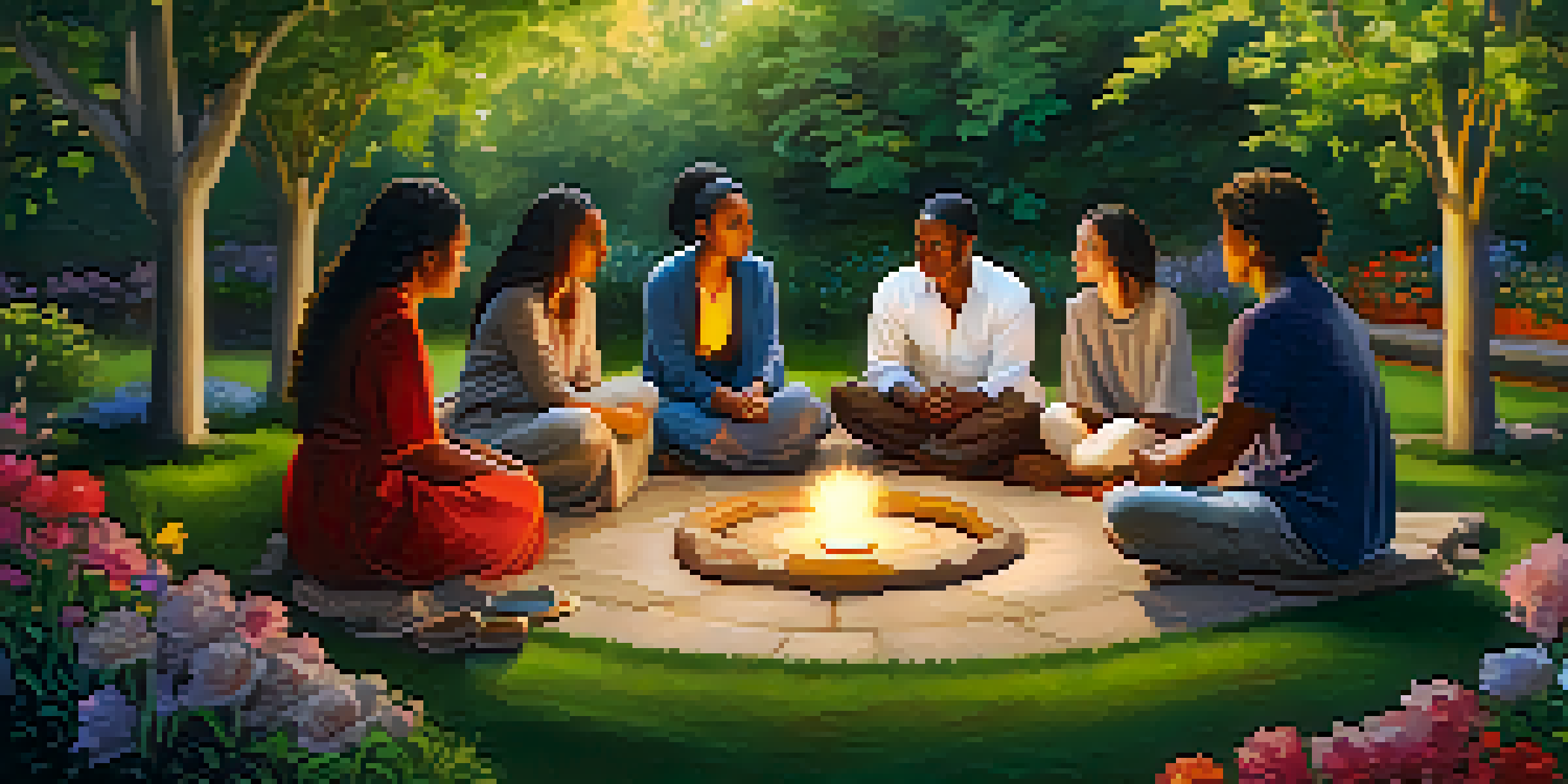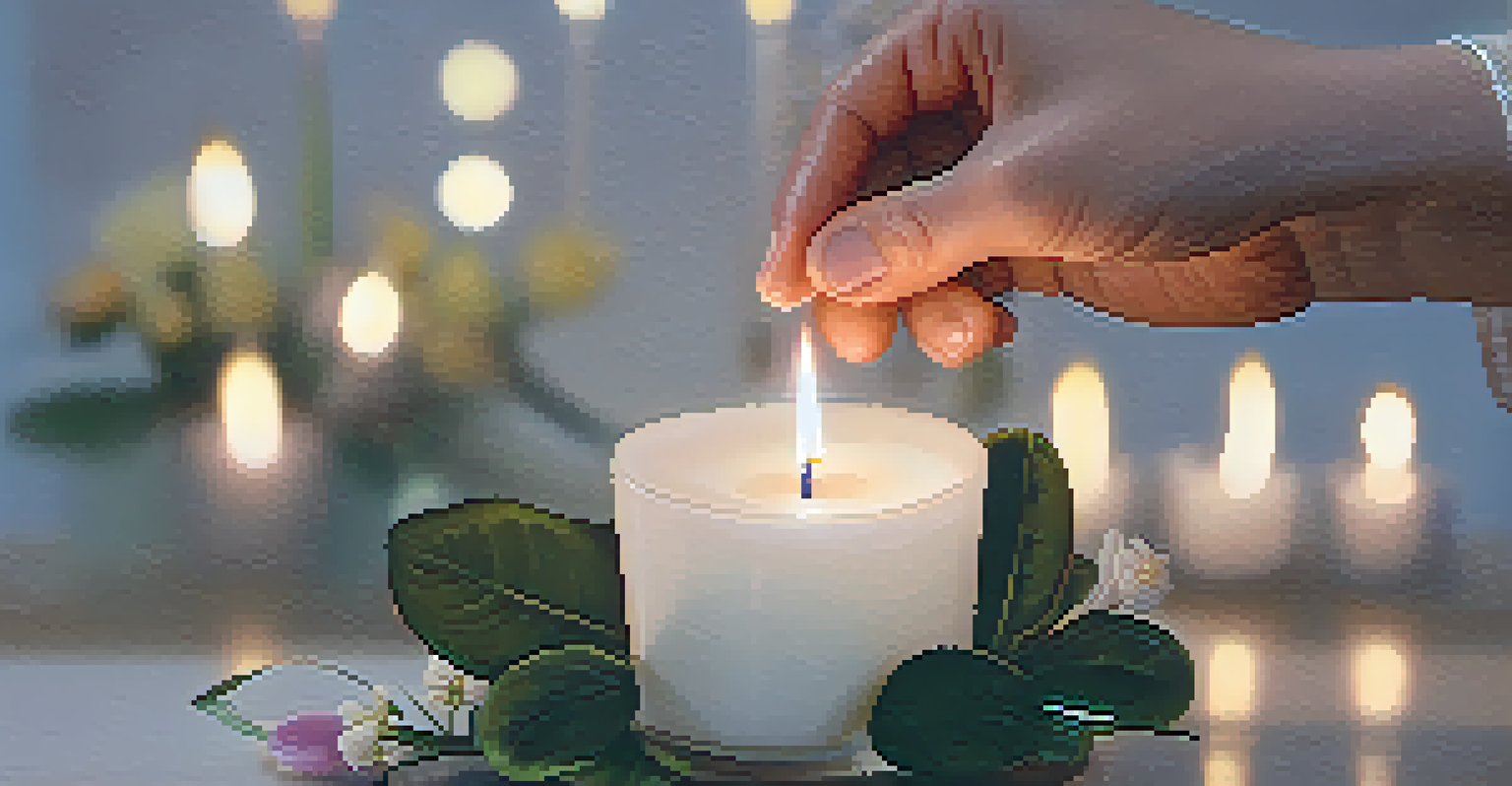Supportive Spiritual Communities for Grieving Souls

Understanding Grief and Its Challenges
Grief is a complex emotional response to loss, often leaving individuals feeling isolated and overwhelmed. It's common for those grieving to experience a whirlwind of emotions, ranging from sadness to anger, and even confusion. During such times, understanding that these feelings are natural can be the first step towards healing.
Grief is not a sign of weakness, nor a lack of faith... It is the price of love.
Many people find themselves searching for support but may not know where to turn. Traditional avenues like family and friends can sometimes fall short, especially if they haven't experienced a similar loss. This is where supportive spiritual communities come into play, offering a safe haven for those in need.
The beauty of these communities lies in their shared understanding of grief. Members often come together, not just to mourn but also to uplift each other, sharing stories and experiences that resonate deeply. This collective experience can foster a sense of belonging and comfort during the most challenging times.
The Role of Spirituality in Healing
Spirituality can be a guiding light in the darkness of grief. Many find solace in spiritual practices, such as prayer, meditation, or mindfulness, which can promote inner peace. These practices help individuals reconnect with themselves and their beliefs, providing a framework for understanding their loss.

Communities centered around spirituality often emphasize the importance of shared rituals, which can play a significant role in the grieving process. Whether it’s lighting candles, holding memorial services, or participating in group meditations, these rituals create a sense of unity and purpose among members. They offer a tangible way to honor loved ones while navigating the pain of their absence.
Grief's Emotional Complexity
Grief is a multifaceted emotional response that can leave individuals feeling isolated, but recognizing these feelings as natural is key to healing.
Moreover, engaging in spiritual activities can help individuals process their grief at a deeper level. This connection to something greater than oneself can foster hope and resilience, encouraging members to move forward while still cherishing their memories. It's about finding strength in vulnerability and discovering peace in the midst of sorrow.
Finding Your Spiritual Community
The journey to find a supportive spiritual community can begin with personal exploration. It’s essential to reflect on what resonates with you—be it a specific faith, a meditation group, or even an online community. Identifying your needs can guide you toward an environment that feels right for your healing journey.
The wound is where the light enters you.
Local places of worship, such as churches, synagogues, or temples, often have grief support groups that welcome newcomers. These groups provide a structured space for sharing experiences and feelings, ensuring that no one feels alone in their grief. Additionally, many spiritual communities are open to all, regardless of background or belief, fostering inclusivity.
If in-person gatherings feel daunting, consider virtual options. Online forums, social media groups, and virtual meditation sessions can connect you with like-minded individuals from around the globe. The key is to seek out spaces that feel safe and welcoming, allowing you to share your story and learn from others.
The Power of Shared Stories
One of the most profound aspects of supportive spiritual communities is the sharing of stories. When individuals recount their personal experiences with loss, it not only validates their feelings but also fosters empathy and connection. Hearing others' journeys can provide insights and comfort, reminding us that we are not alone in our struggles.
These shared narratives can serve as powerful tools for healing. They encourage reflection and can spark conversations about emotions that may be difficult to express. Sharing and listening create a dialogue that often leads to catharsis, allowing grieving souls to process their feelings in a supportive environment.
The Healing Power of Community
Supportive spiritual communities provide a safe space for sharing experiences, fostering connections that help individuals navigate their grief together.
Moreover, such storytelling can inspire hope. As individuals witness others who have navigated their grief, they may find encouragement and strength to face their own challenges. In this way, the sharing of experiences becomes a collective journey toward healing and growth.
Rituals and Practices for Comfort
Rituals play a significant role in many spiritual communities, offering comfort and a sense of stability during turbulent times. These practices can range from simple acts like lighting a candle in memory of a loved one to more elaborate ceremonies that honor their life. Engaging in these rituals can provide a structured way to express grief and remember those who have passed.
Participating in group rituals can also foster community bonds. When people come together to honor their losses, it creates a shared experience that can be incredibly validating. These moments of connection can help individuals feel less isolated in their grief, knowing that others are walking a similar path.
Ultimately, rituals remind us of the importance of remembrance. They create spaces where grief can be expressed openly, allowing individuals to celebrate life even in the face of loss. This blend of sorrow and joy can be a powerful catalyst for healing.
Benefits of Professional Guidance
While supportive spiritual communities offer invaluable emotional support, professional guidance can further enhance the healing process. Grief counselors or spiritual advisors can provide insights and coping strategies tailored to individuals' unique experiences. This professional support can be especially beneficial for those grappling with complicated grief or who feel stuck in their healing journey.
Many spiritual communities collaborate with professionals to offer workshops or seminars focused on grief. These events can provide valuable tools for navigating loss, helping members to process their emotions and find healthy ways to cope. The combination of community support and professional guidance can create a holistic approach to healing.
Rituals Enhance Grieving Process
Engaging in rituals within spiritual communities offers comfort and structure, allowing individuals to express grief and honor their loved ones.
Additionally, professional guidance can help individuals explore their spirituality in a deeper way. Understanding the intersection of grief and spirituality can lead to personal revelations and transformative experiences, enriching one's journey. This dual approach can pave the way for profound healing and personal growth.
Creating Lasting Connections
Building connections within supportive spiritual communities can lead to lasting friendships that extend beyond the grieving process. These bonds often form through shared experiences, as individuals navigate their grief together. The support received during difficult times can lay a strong foundation for meaningful relationships.
As members of these communities continue to heal, they often find themselves wanting to give back. Many choose to volunteer their time or share their stories to help others who are also grieving. This cycle of support not only strengthens the community but also fosters a sense of purpose for individuals navigating their own healing.

Ultimately, the connections forged in these supportive spaces can be a source of joy and resilience. They remind us that even amidst our pain, we can find companionship and understanding. These relationships can transform the grief journey into a shared experience of growth and healing.